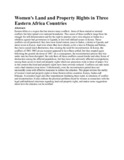| dc.description.abstract | Eastern Africa is a region that has known many conflicts. Some of them started as internal conflicts but later spread over national boundaries. The causes of these conflicts range from the struggle for self-determination and for the right to practice one’s
own religion in Sudan to a rebellion against bad governance in Uganda, to less well-defined causes in Kenya.
Those conflicts are all protracted: they have now lasted sixteen years in Sudan, a dozen in Uganda, and about seven in Kenya. And even where they have abated, as for a time in Ethiopia and Eritrea, they have caused much destruction, thus creating the need for reconstruction. In Kenya, the conflicts of 1991-1993 at one moment appeared to have been settled, but they erupted again following the general elections of 1997. As a consequence, the reconstruction process that was under way has been disrupted.
Not only have all those conflicts caused deaths and other forms of destruction among the affected populations, but they have also adversely affected social patterns, among them access to land and property rights-which are precarious even in times of peace. It is in this context that land and property rights have been severely reduced. Conflicts can only make such a bad situation even worse. Unfortunately, even the reconstruction period does not necessarily come with effective measures to redress the situation.
This paper reviews the reality of women’s land and property rights in three Eastern Africa
countries: Kenya, Sudan and Ethiopia. It considers legal and other impediments hindering these rights in situations of conflict and reconstruction. It also outlines the practical problems faced by women in connection with the legal and traditional structures regarding land and property rights, and makes some suggestions about how the situation can be rectified. | en |

